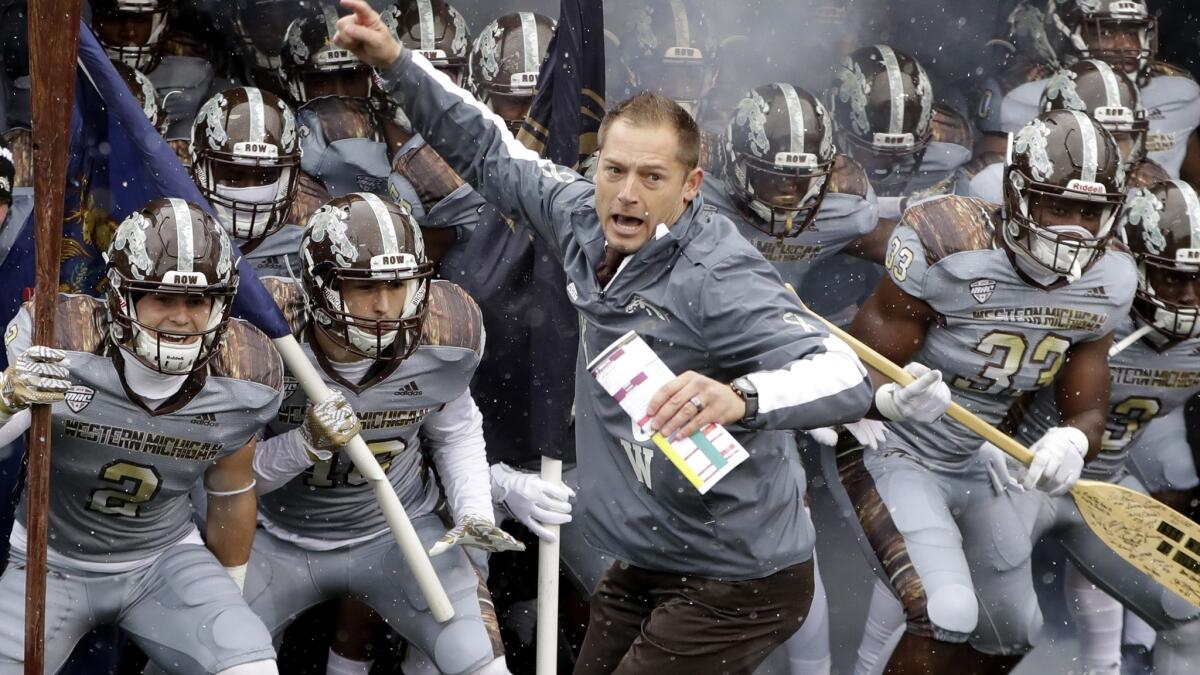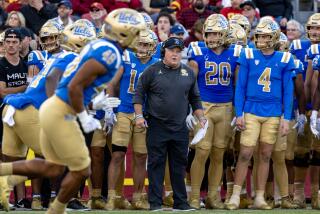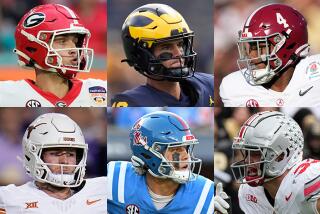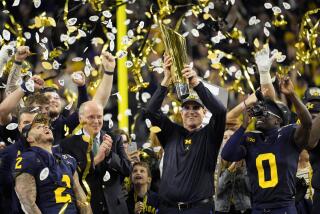Column: P.J. Fleck, a coach with both oars in the water, has unbeaten Western Michigan rowing in right direction

It is far too early in the morning — and far too gloomy — for this guy to be bouncing around like a maniac.
With a damp fog shrouding the football stadium at Western Michigan, P.J. Fleck darts from one drill to the next, urging his team through practice and barking into a wireless microphone. His voice booms from loudspeakers, cutting through the chill.
“Your how, your how,” he says. “Where is your how?”
The coach loves his slogans, cryptic as they might be. Grow Higher flashes from scoreboards above both end zones. On a hillside adjacent to the stadium, there are signs that players can read from afar.
Chemis-tree, says one. Another: Real Roots.
You can’t look anywhere without spotting Fleck’s mantra: Row the Boat. His coaches wear it on their shirts and his players on their helmets. It marks the tunnel leading onto the field.
“I remember when I first heard that,” quarterback Zach Terrell says. “I thought, what does a rowboat have to do with football?”
The whole thing feels like a motivational seminar, as if Tony Robbins infiltrated college sports, as Fleck claps his hands, slaps helmets and joins his defense in a jostling, shouting scrum at midfield.
Outsiders have accused the 35-year-old of being gimmicky, even corny. He doesn’t care.
“Leadership leads,” he bellows into that mic.
Something unusual is transpiring here, on the outskirts of big-time football. Western Michigan has emerged as one of the most intriguing stories of the year.
::
Here in this city of 76,000 about two hours west of Detroit, they talk about the last few seasons in terms of “nevers” — things the football team had never accomplished before.
Since Fleck showed up in 2013, the Broncos have played in back-to-back bowl games and won for the first time in the postseason, defeating Middle Tennessee State in the 2015 Bahamas Bowl.
Friday, they head into their regular-season finale against Toledo with a chance to go 12-0. Sure, their record has grown fat against Mid-American Conference competition and mediocre Big Ten teams in Northwestern and Illinois, but the College Football Playoff rankings have them at No. 21.
“They’ve turned the program around,” Northwestern Coach Pat Fitzgerald said. “They’ve taken young guys who were probably overlooked by our conference and done a great job.”
A win over Toledo would keep the Broncos in a tight race with No. 19 Boise State and No. 20 Houston for the New Year’s bowl slot that goes to the top team in the Group of Five conferences.
“This is really fun,” receiver Corey Davis says. “A lot more fun than when we were 1-11 and no one even knew who we were.”
That was three years ago, when Fleck was an unknown quantity, a thirty-something newcomer still compact and fit and intense from his days as an undersized NFL receiver.
His resume was sparse — before Western Michigan hired him, he had never risen above the level of position coach. It would take a while before word got around about his unusual ideas for running a program.
::
His office is dizzying, every square inch of shelf space filled with knickknacks, the walls covered with family snapshots, catchphrases and photographs of John F. Kennedy. Christmas carols blast over the stereo in mid-November, a lighted tree standing in the corner.
Somewhere amid the clutter is a clue, a scrap of paper saved from childhood. It reads: “Attitude — too busy to be sad, too positive to be negative, too determined to be defeated.”
“My mom always used to send me little cards in my lunch,” he says. “And post-it notes … they’d be all over the house.”
Motivational sayings carried him through an unlikely playing career, the 5-foot-8 receiver setting career records at Northern Illinois through the early 2000s, then making the NFL as an undrafted free agent.
With a degree in elementary education, he planned to teach after pro football. But when the San Francisco 49ers placed him on injured reserve during the 2005 season, then-coach Mike Nolan suggested something different.
Nolan had noticed Fleck staying after practice, helping younger teammates or running routes alone, sometimes firing long snaps into a net despite the fact he wasn’t the team’s long snapper.
“I knew how much he loved football,” Nolan says. “And I could see he loved to teach.”
The 49ers coach asked him to work with the rookie receivers and, just that quickly, Fleck found a purpose.
“It was that selfless serving, giving,” he says. “I thought, this is what I’m destined to do.”
In the summer of 2006, San Francisco cut Fleck and immediately offered him a job on the coaching staff. He accepted a graduate assistant spot at Ohio State instead, eager to work and earn a master’s degree.
His new career had begun.
“A rocket ride,” he says. “I mean, really.”
::
It was 2011 when his newborn son, Colt, died from a heart defect. Fleck was coaching receivers at Rutgers by then.
“When something like that happens, you can go two different ways,” he says. “You can build a wall and never look back. Or you can embrace it and celebrate his life through something else.”
That’s when Fleck came up with Row the Boat, which he saw as more than just coachspeak.
“I wanted something people can use in their everyday life,” he says. “They can use it as their never-give-up attitude for beating cancer, for losing a child, for being divorced.”
The oars represent the energy you bring to each day. You can either give up or stick them back in the water and keep going. The boat itself represents sacrifice — how hard are you willing to row? The final piece of the puzzle is the compass, setting a goal and pointing yourself in that direction.
Row the Boat kept him going that season and the next when he joined the Tampa Bay Buccaneers staff. He says: “I was starting to think about being a head coach and I wanted to use it.”
In the fall of 2012, Kathy Beauregard was looking for someone to take over the football program at Western Michigan. On a business trip to Florida, the athletic director decided to visit Fleck.
“I was already aware of him,” she says. “Everywhere I checked, I got nothing but positive information on how exciting he could be, his passion, his energy level.”
Their first meeting was supposed to be quick but stretched to three hours. Fleck sprung Row the Boat on her, wondering if it might sound weird. Beauregard walked away convinced she had found her next coach.
“I was looking for something a little different,” she says. “Someone to shake things up.”
::
The binder on Fleck’s desk grows thicker all the time, with page after page of definitions for a language he invented and is constantly revising.
“Bronconese,” he calls it. “We have 217 words and you must know every one of them on command.”
The How translates into desire and effort.
Maturity is achieved when grunt work required for success becomes something you want to do because you understand its value.
Nekton mentality refers to aquatic organisms that are always hungry, always attacking.
Players and staff greet each other with “Have an elite day” and exhort each other to “Change your best.” Monthly quizzes ensure everyone remains fluent.
All of this vocabulary is the product of an admittedly overactive brain. Fleck says he often wakes in the middle of the night with ideas, nudging his wife to ask her opinion, reaching for one of the customized Row the Boat notepads he keeps on tables and dressers and shelves throughout his home.
“My mind is everywhere,” he says. “You almost think there’s something wrong with you because it never stops.”
Each season has a new theme that inspires more slogans. Last fall, it was natural disasters, which he presented to his players in the form of How-nadoes and How-icanes.
“What is it about a hurricane that can help us learn about our how?” he says. “It’s like I’m a sixth-grade teacher. I have 105 players who learn 105 different ways and I have to reach every one of them.”
The coach has stood before his team dressed as a boxer and a pirate. He has had the janitors put on Lakers uniforms. Anything to get his message across.
Again, it might sound hackneyed to an outsider and, in his first season at Western Michigan, not everyone appreciated the shtick. Terrell, the quarterback, recalls: “There were maybe 20 guys who bought in.”
As the Broncos stumbled to that 1-11 record, alumni and fans bombarded the athletic department with angry letters.
Fleck called Nolan on a regular basis, worried he might be fired. But he stood his ground — anyone who didn’t adhere to the program was free to leave. Some players transferred.
The turning point came midway through the next season. Western Michigan had started 2-3 and was trailing Ball State by 17 points at halftime. The coach of many words stood before his players and uttered only a few.
“When are you tired of being average?” he recalls. “That’s all I asked them.”
::
It is a rare moment when Fleck is both still and quiet. He ponders for a few seconds, his eyes focused somewhere far off.
“I will eventually get fired from this job,” he says. “I know that.”
The nature of coaching is undeniable. The Broncos’ comeback victory in that Ball State game, the 8-5 records in 2014 and 2015, this fall’s undefeated run — no program can stay on a roll forever.
Maybe he gets a better job before then, but the pressure to win never abates. That is why Fleck views results as ephemeral if not secondary.
His team knows about Colt’s death and the breakup of his first marriage. He throws his life open to his players because, statistically speaking, a significant percentage of them might someday get divorced. A few might lose a child.
“Wins will never define me as a person,” he says. “It will be the players we affected and the people and the fun we had talking about the process and the things we learned.”
When he drives down the street in Kalamazoo and the person in the car next to him rolls down the window, calling his name, mimicking the action of rowing a boat, he suspects his philosophy has spread beyond the confines of the Western Michigan roster.
Different sorts of letters now come to athletic department, written by people who say they have been inspired.
Fleck used to send out oars — actual, full-sized oars — but that became cumbersome and expensive. A local business has stepped forward to pay for miniature oars. Pink ones for breast cancer, yellow for the military, jigsaw-designed for autism.
“Some people question whether it’s authentic,” Terrell says. “But we see it every day, the positivity, and that’s when you believe.”
Morning practice inside Waldo Stadium is nearing its end, Fleck chewing on his pen and watching intently as his defense breaks down, allowing the scout team to run for a long gain.
The coach reaches back to switch on his microphone.
“Process, process, process,” he yells. “It’s the hard way.”
The next moment, he spins and dashes toward a red-zone drill at the opposite goal line. He yells again, telling his offense, “Decisive decision-making,” not once but twice.
The fog has finally begun to lift, the sun peeking through near midday. As the quarterback lofts a pass into the end zone, the scoreboard at the end of the stadium — Grow Higher — burns a little more brightly.
More to Read
Get our high school sports newsletter
Prep Rally is devoted to the SoCal high school sports experience, bringing you scores, stories and a behind-the-scenes look at what makes prep sports so popular.
You may occasionally receive promotional content from the Los Angeles Times.







